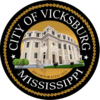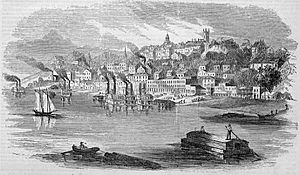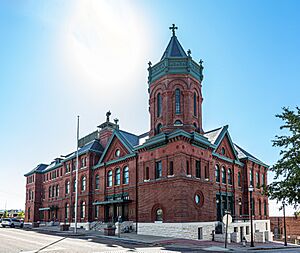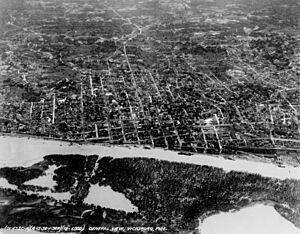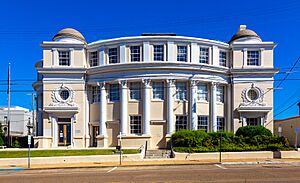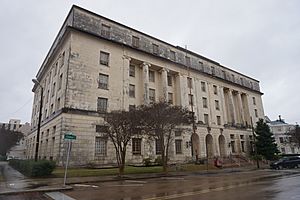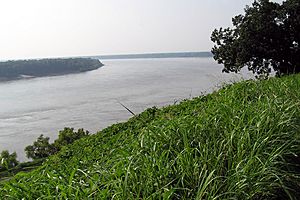Vicksburg, Mississippi facts for kids
Quick facts for kids
Vicksburg, Mississippi
|
|||
|---|---|---|---|
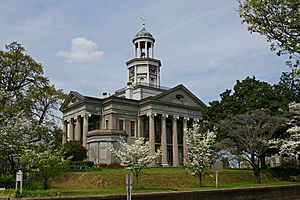
Old Warren County Courthouse ("Old Courthouse Museum")
|
|||
|
|||
| Nickname(s):
"Gibraltar of the Confederacy", "Red Carpet City of the South"
|
|||
| Country | United States | ||
| State | Mississippi | ||
| County | Warren | ||
| Founded | 1811 | ||
| Incorporated | January 29, 1825 | ||
| Named for | Newitt Vick | ||
| Government | |||
| • Type | Mayor–council government | ||
| Area | |||
| • City | 35.093 sq mi (90.890 km2) | ||
| • Land | 33.017 sq mi (85.513 km2) | ||
| • Water | 2.076 sq mi (5.377 km2) 5.92% | ||
| Elevation | 200 ft (61 m) | ||
| Population
(2020)
|
|||
| • City | 21,573 | ||
| • Estimate
(2024)
|
20,032 | ||
| • Density | 614.738/sq mi (237.353/km2) | ||
| • Urban | 25,888 | ||
| • Metro | 42,105 (US: 299th) | ||
| Time zone | UTC–6 (Central (CST)) | ||
| • Summer (DST) | UTC–5 (CDT) | ||
| ZIP Codes |
39180, 39181, 39182, 39183
|
||
| Area code(s) | 601 and 769 | ||
| FIPS code | 28-76720 | ||
| GNIS feature ID | 2405648 | ||
Vicksburg is a city in Mississippi, United States. It is the main city of Warren County. In 2020, about 21,573 people lived there. The city sits on a high bluff next to the Mississippi River, across from Louisiana. French settlers first built an outpost here in 1719. It became known as Vicksburg in 1825, named after a Methodist missionary named Newitt Vick.
Before Europeans arrived, the Natchez lived in this area for a long time. French colonists built Fort Saint Pierre nearby in 1719. They traded furs with the Natchez and started farms.
During the American Civil War, Vicksburg was a very important port for the Confederate side. Its surrender in July 1863 to General Ulysses S. Grant was a major turning point in the war. This happened around the same time as the Battle of Gettysburg.
After the war, Vicksburg faced many challenges as people worked to rebuild and define new rights for all citizens. Today, many African Americans live in Vicksburg. The city is also home to important offices of the United States Army Corps of Engineers. This group often helps with flood control in the area.
Contents
History of Vicksburg
Early Inhabitants of Vicksburg
Long ago, the land where Vicksburg now stands was home to the Natchez people. These Native Americans had their own unique language. Before the Natchez, other ancient cultures lived in this important river area for thousands of years.
European Settlers Arrive
The first Europeans to settle here were French colonists. In 1719, they built Fort Saint Pierre on high ground overlooking the Yazoo River. This is near what is now Redwood. The French traded furs with the Natchez and started farms.
In 1729, the Natchez attacked the fort and nearby farms. Many lives were lost during this conflict. The French, with help from the Choctaw, eventually defeated the Natchez.
The Choctaw Nation then took over the area. In 1801, they agreed to give a large amount of land to the United States. Later, in 1830, most of the Choctaw moved west of the Mississippi River. Some Choctaw stayed in Mississippi. They worked hard to keep their culture alive in a society that often divided people into just two groups.
In 1790, the Spanish built a military outpost here called Fort Nogales. This name means "walnut trees." When Americans took control in 1798, they renamed it Walnut Hills. The small town became Vicksburg in 1825. It was named after Newitt Vick, a Methodist minister who started a church mission there.
The town of Vicksburg grew, reaching a population of 3,000 by 1825. Some of the early residents included Jewish families who had moved from Europe.
In 1835, the town faced challenges with law and order. Citizens wanted to make the city safer.
By 1862, fifty Jewish families in Vicksburg formed a group called the Hebrew Benevolent Congregation Anshe Chesed. They later created the second Jewish cemetery in the city.
Jefferson Davis, who was the president of the Confederate States, had his family farm just south of Vicksburg.
Vicksburg During the Civil War
During the American Civil War (1861–1865), Vicksburg was a very important city. It was a key river port for the Confederate Army. The city was located on a high bluff, making it very hard to attack.
In 1863, the Union Army, led by General Ulysses S. Grant, began the Siege of Vicksburg. For 47 days, Union forces surrounded the city, cutting off its supplies. The goal was to make the city surrender without a direct attack.
Confederate General John C. Pemberton surrendered Vicksburg on July 4, 1863. This event, along with the Union victory at the Battle of Gettysburg the day before, was a major turning point in the Civil War. It gave the Union control of the entire Mississippi River.
After Vicksburg surrendered, the area was under Union military control until the war ended in 1865. For many years, celebrations of July 4th in Vicksburg were not common. However, by the early 1900s, large parades and celebrations began to take place.
Changes to Vicksburg's River Access
Vicksburg's location on the Mississippi River made it a busy trading center in the 1800s. Many steamboats carried cotton and other goods to and from the city.
However, in 1876, a big flood changed the course of the Mississippi River. The river moved away from Vicksburg, leaving the city with only a small, calm lake. This made it hard for boats to reach Vicksburg, and the city's economy suffered.
It wasn't until 1903 that the U.S. Army Corps of Engineers built a new canal. This canal reconnected Vicksburg to the Mississippi River, allowing steamboats to return.
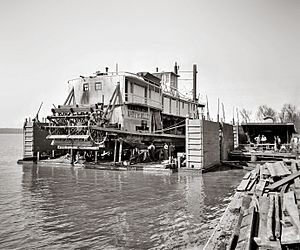
Challenges After the Civil War
After the Civil War, Vicksburg experienced difficult times. Groups formed that caused trouble and tried to stop African Americans from having their new rights.
In the 1870s, there were serious conflicts and challenges as different groups struggled for power and rights in the city. During these times, many people faced unfair treatment and violence, especially African Americans who were trying to use their new rights.
To help restore order, President Ulysses S. Grant sent federal troops to Vicksburg in 1875. Later, new laws were made that made it very hard for many African Americans and some poor white people to vote. These laws also created segregation, which meant public places were separated for different races.
In 1894, something sweet happened in Vicksburg! Joseph A. Biedenharn, a local candy maker, bottled Coca-Cola for the very first time. Today, his original candy store is the Biedenharn Coca-Cola Museum. It's a popular spot for collectors of Coca-Cola items.
Vicksburg in the 20th Century
Challenges related to racial inequality continued into the 20th century. There were sad instances of injustice during this period.
The United States Army Corps of Engineers helped Vicksburg regain its river access in 1903. They redirected the Yazoo River into the old Mississippi channel. This allowed steamboats to use the port again. However, by then, many people and goods were traveling by train.
A bridge for both trains and cars was built across the Mississippi River in 1929. Today, Interstate 20 also crosses the river here. Vicksburg is an important crossing point over the Mississippi River in this region.
In 1927, a huge flood, known as the Great Mississippi Flood of 1927, covered vast areas. Vicksburg became a main gathering spot for people seeking safety. The US Army Corps of Engineers later created a special laboratory here. It helps develop ways to control floods and manage river navigation. This lab is now called the Engineer Research and Development Center.
In December 1953, a strong tornado hit Vicksburg. It caused 38 deaths and damaged nearly 1,000 buildings.
During World War II, British Royal Air Force cadets used Vicksburg for training flights. It was a stand-in for Cologne, Germany, which was the same distance from London as Vicksburg was from their training base.
After World War II, many African American veterans worked for equal rights and fair treatment for everyone. This led to the civil rights movement in Vicksburg during the 1960s.
Vicksburg Today: Early 21st Century
In 2001, Vicksburg residents were inspired by a mural project in Kentucky. In 2002, they started their own mural program on the floodwall downtown. These murals show important moments from Vicksburg's history. They include stories about President Theodore Roosevelt's bear hunt, famous steamboats, the Siege of Vicksburg, and the Great Mississippi Flood of 1927. The project was completed in 2009.
In 2010, a new mural was painted on Grove Hill. It shows the annual "Run thru History" event held in the Vicksburg National Military Park.
In December 2014, a special meeting was held to remember the events of 1874. Scholars discussed the history of the city and its challenges.
Geography and Climate
Vicksburg covers about 35 square miles (90 square kilometers). About 2 square miles (5 square kilometers) of this area is water.
The city is located where the Mississippi and Yazoo Rivers meet. Much of Vicksburg sits on a high bluff on the east bank of the Mississippi River. Interstate 20 runs through Vicksburg, connecting it to other cities like Memphis to the north and Baton Rouge to the south. It's the only interstate highway crossing of the Mississippi River between Baton Rouge and Memphis.
Vicksburg's Climate
Vicksburg has a humid subtropical climate. This means it has mild winters and hot, humid summers.
| Climate data for Vicksburg, Mississippi (Vicksburg – Tallulah Regional Airport) 1991–2020 normals, extremes 1948–present | |||||||||||||
|---|---|---|---|---|---|---|---|---|---|---|---|---|---|
| Month | Jan | Feb | Mar | Apr | May | Jun | Jul | Aug | Sep | Oct | Nov | Dec | Year |
| Record high °F (°C) | 85 (29) |
87 (31) |
89 (32) |
92 (33) |
97 (36) |
102 (39) |
104 (40) |
107 (42) |
105 (41) |
98 (37) |
89 (32) |
85 (29) |
107 (42) |
| Mean maximum °F (°C) | 75.7 (24.3) |
78.7 (25.9) |
83.4 (28.6) |
87.2 (30.7) |
91.5 (33.1) |
95.1 (35.1) |
97.4 (36.3) |
98.2 (36.8) |
96.0 (35.6) |
90.4 (32.4) |
82.4 (28.0) |
77.6 (25.3) |
99.4 (37.4) |
| Mean daily maximum °F (°C) | 57.2 (14.0) |
61.9 (16.6) |
69.6 (20.9) |
76.9 (24.9) |
84.3 (29.1) |
90.2 (32.3) |
92.6 (33.7) |
92.8 (33.8) |
88.4 (31.3) |
79.1 (26.2) |
67.8 (19.9) |
59.6 (15.3) |
76.7 (24.8) |
| Daily mean °F (°C) | 47.6 (8.7) |
51.8 (11.0) |
59.1 (15.1) |
66.2 (19.0) |
73.9 (23.3) |
80.4 (26.9) |
82.8 (28.2) |
82.4 (28.0) |
77.2 (25.1) |
66.6 (19.2) |
55.9 (13.3) |
49.7 (9.8) |
66.1 (18.9) |
| Mean daily minimum °F (°C) | 37.9 (3.3) |
41.7 (5.4) |
48.7 (9.3) |
55.5 (13.1) |
63.5 (17.5) |
70.6 (21.4) |
73.1 (22.8) |
72.0 (22.2) |
66.1 (18.9) |
54.0 (12.2) |
44.0 (6.7) |
39.7 (4.3) |
55.6 (13.1) |
| Mean minimum °F (°C) | 20.2 (−6.6) |
25.6 (−3.6) |
30.3 (−0.9) |
38.5 (3.6) |
48.7 (9.3) |
59.6 (15.3) |
65.7 (18.7) |
63.5 (17.5) |
51.2 (10.7) |
35.7 (2.1) |
26.5 (−3.1) |
23.0 (−5.0) |
18.3 (−7.6) |
| Record low °F (°C) | −2 (−19) |
−12 (−24) |
11 (−12) |
28 (−2) |
37 (3) |
47 (8) |
54 (12) |
52 (11) |
34 (1) |
22 (−6) |
15 (−9) |
4 (−16) |
−12 (−24) |
| Average precipitation inches (mm) | 5.44 (138) |
5.11 (130) |
5.02 (128) |
5.96 (151) |
3.85 (98) |
3.74 (95) |
4.05 (103) |
3.75 (95) |
3.00 (76) |
4.13 (105) |
3.92 (100) |
5.38 (137) |
53.35 (1,356) |
| Average precipitation days (≥ 0.01 in) | 9.3 | 10.1 | 9.9 | 8.4 | 9.5 | 9.1 | 9.7 | 9.4 | 6.8 | 7.5 | 8.7 | 10.1 | 108.5 |
| Source: NOAA | |||||||||||||
People and Population
| Historical population | |||
|---|---|---|---|
| Census | Pop. | %± | |
| 1850 | 3,678 | — | |
| 1860 | 4,591 | 24.8% | |
| 1870 | 12,443 | 171.0% | |
| 1880 | 11,814 | −5.1% | |
| 1890 | 13,373 | 13.2% | |
| 1900 | 14,834 | 10.9% | |
| 1910 | 20,814 | 40.3% | |
| 1920 | 18,072 | −13.2% | |
| 1930 | 22,943 | 27.0% | |
| 1940 | 24,460 | 6.6% | |
| 1950 | 27,948 | 14.3% | |
| 1960 | 29,143 | 4.3% | |
| 1970 | 25,478 | −12.6% | |
| 1980 | 25,434 | −0.2% | |
| 1990 | 20,908 | −17.8% | |
| 2000 | 26,407 | 26.3% | |
| 2010 | 23,856 | −9.7% | |
| 2020 | 21,573 | −9.6% | |
| 2024 (est.) | 20,032 | −16.0% | |
| U.S. Decennial Census 2020 Census |
|||
The average price of a home in Vicksburg is around $137,869.
In 2023, there were about 8,158 households in Vicksburg. The average household had 2.50 people. The median household income was $42,484. About 27.9% of the city's population lived at or below the poverty line. About 50.1% of the population was employed. Many residents have a high school diploma (84.8%), and 23.9% have a bachelor's degree or higher.
Most people in Vicksburg speak English (96.1%). Spanish is the next most common language (2.4%). The median age in the city was 39.0 years.
| Race / ethnicity (NH = non-Hispanic) | Pop. 1990 | Pop. 2000 | Pop. 2010 | Pop. 2020 | % 1990 | % 2000 | % 2010 | % 2020 |
|---|---|---|---|---|---|---|---|---|
| White alone (NH) | 8,437 | 9,873 | 7,301 | 5,974 | 40.35% | 37.39% | 30.60% | 27.69% |
| Black or African American alone (NH) | 12,290 | 15,892 | 15,715 | 14,423 | 58.78% | 60.18% | 65.87% | 66.86% |
| Native American or Alaska Native alone (NH) | 13 | 40 | 41 | 27 | 0.06% | 0.15% | 0.17% | 0.13% |
| Asian alone (NH) | 59 | 157 | 210 | 209 | 0.28% | 0.59% | 0.88% | 0.97% |
| Pacific Islander alone (NH) | — | 2 | 8 | 0 | — | 0.01% | 0.03% | 0.00% |
| Other race alone (NH) | 6 | 25 | 9 | 48 | 0.03% | 0.09% | 0.04% | 0.22% |
| Mixed race or multiracial (NH) | — | 144 | 163 | 489 | — | 0.55% | 0.68% | 2.27% |
| Hispanic or Latino (any race) | 103 | 274 | 409 | 403 | 0.49% | 1.04% | 1.71% | 1.87% |
| Total | 20,908 | 26,407 | 23,856 | 21,573 | 100.00% | 100.00% | 100.00% | 100.00% |
As of the 2020 census, Vicksburg had 21,573 people, 9,277 households, and 5,317 families. The city's population density was about 653 people per square mile. The racial makeup was 28.16% White, 67.21% African American, 0.15% Native American, 0.97% Asian, and 2.86% from two or more races. Hispanic or Latino people made up 1.87% of the population.
Vicksburg's Economy
Vicksburg is home to three large offices of the US Army Corps of Engineers. These include the Engineer Research and Development Center (ERDC), which has a special lab called the Waterways Experiment Station. The ERDC works on military engineering, information technology, and flood control.
The 412th Engineer Command of the US Army Reserve and the 168th Engineer Brigade of the Mississippi Army National Guard are also located in Vicksburg. The United States Coast Guard has a unit here that helps maintain navigation aids on the Lower Mississippi River.
The Army Corps of Engineers is very important to Vicksburg's economy. About 12.3% of the local workers are employed by the federal government.
Casinos in Vicksburg
Vicksburg has four casinos located along the Mississippi River:
- Ameristar Casino Vicksburg
- Casino Vicksburg (formerly Lady Luck Casino Vicksburg)
- Riverwalk Casino Hotel
- Water View Casino
Arts and Culture in Vicksburg
Annual Cultural Events
Every summer, Vicksburg hosts the Miss Mississippi Pageant and Parade. Also, the Vicksburg Homecoming Benevolent Club holds a reunion weekend. This event helps provide scholarships for high school seniors.
Since 1936, the Vicksburg Theatre Guild has performed Gold in the Hills. This show holds a Guinness World Record for being the longest-running show!
Places to Visit in Vicksburg
- Vicksburg City Hall, a beautiful building from 1902.
- Anchuca Mansion (1830)
- Balfour House (1835)
- McRaven House (around 1797)
- Old Court House Museum (1861)
- Vicksburg National Military Park, a historic site from the Civil War.
- Pemberton's Headquarters
- U.S.S. Cairo Gunboat & Museum
- Vicksburg Riverfront Murals (started in 2002)
- Vicksburg Theatre Guild
City Government
Vicksburg's city government has a mayor, who is elected by all citizens. There are also two aldermembers, each elected from a different part of the city. The current mayor is Willis Thompson.
Past mayors include Robert Major Walker, who was the city's first African American mayor, elected in 1988.
Education in Vicksburg
Schools for Kids
The Vicksburg-Warren School District serves the city of Vicksburg.
- Vicksburg High School
- Warren Central High School
- Vicksburg Junior High School
- Warren Central Junior High School
- Academy of Innovation
There are also several elementary schools, including:
- Beechwood Elementary School
- Bovina Elementary School
- Bowmar Avenue Magnet School
- Dana Road Elementary School
- Redwood Elementary School
- Sherman Avenue Elementary School
- South Park Elementary School
- Warrenton Elementary School
Private schools in Vicksburg include:
- Porters Chapel Academy
- Vicksburg Catholic School (St. Francis Xavier Elementary and Saint Aloysius Catholic High School)
- Vicksburg Christian Academy
- Vicksburg Community School (K-12)
Colleges and Universities
Warren County is part of the district for Hinds Community College.
Media and News
Newspapers
- The Vicksburg Daily News
- The Vicksburg Post
Radio Stations
Television Channels
Transportation in Vicksburg
For many decades, the Illinois Central Railroad provided passenger train service through Vicksburg. Trains like the Planter traveled north to Memphis, Tennessee and south to New Orleans. The last passenger train serving Vicksburg was in 1967.
Interstate 20 runs east-west through the southern part of Vicksburg. U.S. Highway 80 and U.S. Highway 61 also run through the city.
The closest airport with commercial flights is Jackson–Medgar Wiley Evers International Airport, which is about 53 miles east of Vicksburg. For smaller planes, there are the Vicksburg Tallulah Regional Airport and Vicksburg Municipal Airport.
Notable People from Vicksburg
Many interesting people have come from Vicksburg, including:
- Katherine Bailess, an actress, singer, and dancer.
- Ed Bearss, a famous Civil War historian.
- Joseph A. Biedenharn, who first bottled Coca-Cola in Vicksburg.
- Charles Burnett, a filmmaker.
- Malcolm Butler, a football player for the New England Patriots and Tennessee Titans.
- Willie Dixon, a well-known blues musician.
- Myrlie Evers-Williams, a civil rights activist and journalist.
- Milt Hinton, a jazz bassist.
- Patrick Kelly, a fashion designer.
- George Reed, a former Canadian football running back.
- Beah Richards, an African-American film and television actress.
- Mary T. Washington, the first African-American woman CPA.
See also
 In Spanish: Vicksburg para niños
In Spanish: Vicksburg para niños
 | Dorothy Vaughan |
 | Charles Henry Turner |
 | Hildrus Poindexter |
 | Henry Cecil McBay |



